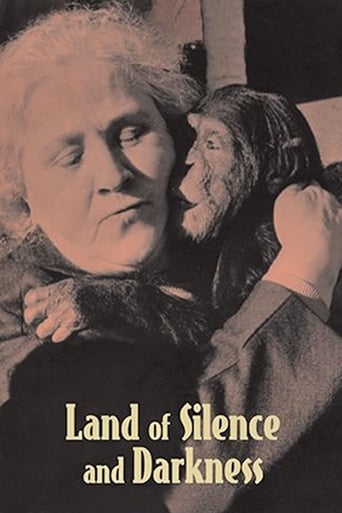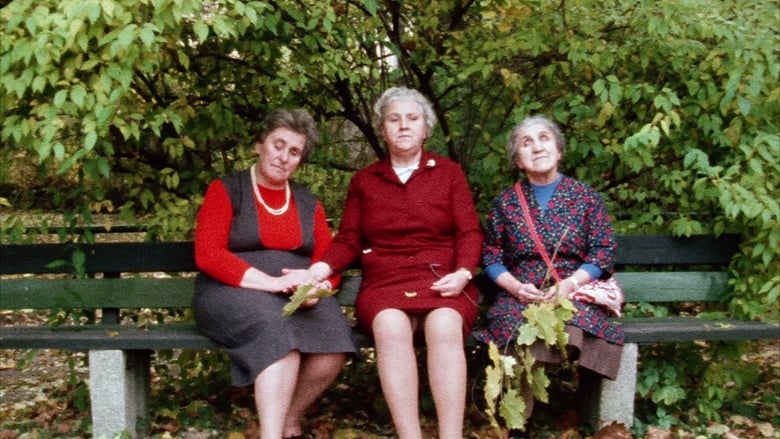
Through examining Fini Straubinger, an old woman who has been deaf and blind since her teens, and her work on behalf of other deaf-blind people, this film shows how the deaf-blind struggle to understand and accept a world from which they are almost wholly isolated.
Reviews
Slow pace in the most part of the movie.
Good movie but grossly overrated
This is a coming of age storyline that you've seen in one form or another for decades. It takes a truly unique voice to make yet another one worth watching.
Exactly the movie you think it is, but not the movie you want it to be.
Before you keep reading my review, will you do me a favor. Please shut your eyes and ears for a moment, then go to the fridge, get out something from it. Oh and don't forget washing your hands before that. Did you manage? Now imagine you'd have never seen your fridge in your life. Or heard the water during washing your hands. Or seen the way you went to doing these things. Then you'd roughly have the impression of what life must look like for the people in this 82-minute documentary. German filmmaker Werner Herzog was still in his 20s when he shot this movie here as it was done in 1971 and has its 45th anniversary already this year.Herzog is known to enter worlds that only very few people have seen apart from him. This one is not about a volcano about to erupt on a deserted island, but about the world of silence and darkness, namely about people who are deaf and blind and have been that way for their entire life perhaps. They are certainly living in their own world. And it is a world that society knows about, acknowledges, but does not really want to be a part of. How many people do you know that are deaf and mute? How many people do your friends and family know? They exist, but we do not want to be concerned with them. You could almost say that we exist in a different dimension than they do. And that is why I love Herzog so much. Many people just would not want to get in contact with these people, not because they despise them, but because they wouldn't know how to act towards them. Herzog is not scared at all. He delivers a truly informative and (even more important) touching portrayal of these people. My favorite scene was probably the one with the disabled at the zoo. Could there have anything been better in this film? I really cannot think of anything. I personally love listening to Herzog's voice, but he did not act as narrator yet in his earliest works. Then again, Illig's narration was really not too frequent and that is perfect. In here they let the people tell the story, the people who deal with the blind-deaf on a daily basis. No scientist, no narrator could make more insightful comments on the matter than they could. An outstanding documentary by a brilliant filmmaker. What a year for Herzog. "Fata Morgana" is equally outstanding. Highly recommended and that goes for both documentaries.
Once again the cult German director Werner Herzog touches deeply in our heart. I think, everyone should see this documentary. Makes us realize that sometimes we should rethink and reevaluate our "insignificant" problems. I say that, cause when i saw "Land of Silence and Darkness", all my "insignificant" problems are nothing in comparison with persons, who could not see, hear and speak. Its a powerful and honest documentary, about a forgotten small portion of persons that live in the edge of existence, they actually live in a innocuous void of "silence and darkness". Werner Herzog give us a masterful piece of documentary without being pretentious or sentimentalist. He simply shows the reality just the away she is. If you like this one, i recommend any other Werner Herzog Documentary.
'Land of Silence and the Darkness', written and directed by Werner Herzog, is an extraordinary documentary -- remember that word, please -- about Fini Straubinger. As a child in Germany, she suffered a terrible fall which caused a popping sensation in her neck. She was afraid to tell her parents (I can well believe this), so the injury was never treated. As a teen, she progressively lost her hearing and her sight, becoming totally deaf and blind. When Herzog made this film, Straubinger was well past middle age, and had spent most of her life in silence and darkness.Americans who see this film will be reminded of Helen Keller. But Keller lost her sight and hearing (to scarlet fever) in very early childhood, and retained only very slight memory of her stolen senses. (Touchingly, Keller did recall seeing the rainbows formed by sunlight refracted through the crystal prisms of her mother's chandelier.) Because Straubinger retained a full memory and understanding of vision and sound, she became useful as an ambassador to the kingdoms of the blind and deaf. Fini Straubinger has dedicated her life to working with people who are deaf and blind, most of whom have borne those double handicaps either from birth or (like Keller) from infancy.Herzog follows Straubinger on a trip through Germany, financed by an organisation for the deaf-blind. We see her communicating with other deaf-blind people through a sort of tapping code. Activities which the rest of us take for granted are truly alien experiences for these unfortunate souls. For instance, the simple act of taking a shower: for someone who has never experienced this before, and cannot have it adequately explained, the sudden onslaught of pressurised water is deeply terrifying. In the final sequence, we see a deaf-blind man hugging a tree: attempting to experience this alien life-form through his senses of touch, taste and smell.One sequence, showing Straubinger interacting with a chimpanzee, I found unpleasant and unnecessary. I get the impression that this scene was staged by Herzog in an ill-thought attempt to inject some light 'comedy relief' into a subject that audiences might find deeply depressing.I made a point of identifying this film as a documentary, meaning it's non-fiction. Indeed, Fini Straubinger is a real person: her blindness, her deafness, and (more importantly) her work with the deaf-blind are all real, all true. At one point in this film, Straubinger tells us that her most vivid sensory memory -- before the darkness and silence closed in -- is an image of the rapturous faces of ski jumpers as they leap into the sky. After this film was released, Herzog admitted in an interview that Straubinger had never seen a ski jumper: Herzog wrote those lines for her, because he felt that ski jumpers provided the visual symbol (I refuse to misuse the word 'metaphor') which would simultaneously represent sensory rapture and Straubinger's own isolation.I reluctantly concede that this sort of fictionalisation is a valid device in documentary films. Those of us who are fortunate to see and hear cannot truly experience the dark silent world of Fini Straubinger and her colleagues. (Unless we too are conscripted into that realm, by accidents or illness.) Since this film can never truly put us into the mind of a deaf-blind person -- especially one who has been both deaf and blind since birth, like most of the people encountered here -- some degree of invention is necessary. I recall an anecdote told by Albert Einstein (too long to repeat here; send me an email if you want the details) concerning his attempt to explain milk to a blind man: this incident never actually occurred, but Einstein told the story to prove a point about his theory of relativity.'Land of Silence and the Darkness' is a fascinating film about a fascinating human being. My rating: 8 out of 10.
Land of Silence is a really great documentary, one of Herzog's best I must say. His other documentaries are a bit uneven, which his movies are not. But this one, as well as his recent "Little Dieter Needs to Fly", are amongst the most moving documentaries I've ever seen. And they are still unique, Werner Herzog's personal traits can be seen everywhere. The transcendent landscapes, pure human beings, humour, it's all there.The text on the back cover explains the movie very well:"Some who live in this land have learned to speak, though they communicate with each other by touch language: what they say comes from the most profound depths of human experience, and is often startingly beautiful and exiting. This is not a depressing movie at all. Neither is it a movie for voyeurs of the grotesque. As Anita Earle writes, 'It is, rather, a testament from another plane of existence'"At some points in this movie I laughed. The camera often stays very long on lonely, depressing people who spend their days either sitting or lying down. But it wasn't meant to be comedy, it is a way for me to step back. It is a very 'close' picture, it really gets to you. You're thinking "Jesus", and you want to react. And still, it is an artwork.
Top Streaming Movies













